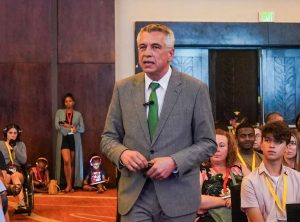This article is part of an extensive feature on the 2024 HAEi Regional Conference Americas, published in Global Perspectives #1 2024
Take Action and You Will Succeed
 With an enthusiastic introduction from Tony Castaldo, Prof. Marcus Maurer’s passion for HAE and patients was clear as he began his keynote lecture.
With an enthusiastic introduction from Tony Castaldo, Prof. Marcus Maurer’s passion for HAE and patients was clear as he began his keynote lecture.
Prof. Maurer told the audience that bringing them a message of hope gave him great joy. He believes that “together, as a community of patients, physicians, industry, family and friends, we give people with HAE a better life, a normal life.” To achieve that, we need to TAKE ACTION. He acknowledged that we can be very proud of what has been achieved. But what we’re doing right now is not enough. There is still a long way to go.
He recounted a discussion with a patient on the journey from the airport in Panama. She told him that her care was not where she wanted it to be, and she feared attacks. Prof. Maurer said that this reflects what many patients in many of the Americas countries go through.
The Angioedema Centers of Reference and Excellence (ACARE), of which Prof. Maurer is a leading part, number 99 globally. In the Americas, many countries have a participating center, such as Panama, Costa Rica, Bolivia, Brazil, Argentina, Colombia, Ecuador, as well as the US and Canada.
“We have to bring this to all patients everywhere,” he said. Prof. Maurer encouraged those in the audience to act by identifying physicians in their country and encouraging them to become part of ACARE. He continued, “ACARE is a bottom-up organization driven by the desire of patients to make this world a better world for them and others like them.”
ACARE means you can expect the highest possible standard of care. There are 32 criteria to become an ACARE. It’s not easy. Unsurprisingly, Prof. Maurer’s favorite criterion is the ‘Never Give Up’ attitude. ACAREs don’t give up. Problems don’t stop them. Ways are found to overcome obstacles to help patients get the care they need. Prof. Maurer reiterated that ACARE is not just for physicians. “Patient advocates, working with physicians, make ACAREs great.”
But there’s more than just care; there’s research. ACARE seeks to push the boundaries, to better understand the disease, to understand the unmet needs, and to understand where things are not working so that we can change them together. “Research gives you, people
with HAE, the loud voice needed to convince people
who have the power to make decisions about better treatments, care, and diagnostics,” said Prof. Maurer before sharing some ongoing research projects.
First, a program called Sherpa which looks at switching from old androgen treatment to modern treatment
Genetic testing is available to every patient in ACARE. This identifies the underlying genetic mutation, which is the cause of the disease that affects you and your family, Prof. Maurer informed the audience.
Calling HAE a horrible disease that ‘stinks,’ Prof. Maurer described the importance of patient-reported outcomes being used to show the need to treat. These measure disease activity and impact and should be used extensively in clinical practice, Prof. Maurer said, which is why an ACARE project is looking at them.
Another program examines HAE in pregnancy to ensure that physicians can better guide female patients and offer the best care.
Prof. Maurer admitted to being very excited about an artificial intelligence project. This program uses just 10 questions to decide on a patient’s diagnosis of HAE. It is already correct in more than 90% of cases. Prof. Maurer admitted this is better than he or anyone else can do, and this program is working to make the machine even better.
Prof. Maurer turned to the angioedema registry, CARE, which he called his favorite project, “It demonstrates that no one is alone.” Whether in the Americas, Asia, Africa, or Europe, people with HAE have similar and different challenges to face with their disease. Pulling together a global database means we can learn. His call to action was to encourage your physicians to join, or if you are a physician, encourage your patients to be included in CARE.
Highlighting the many ongoing programs to educate physicians, Prof. Maurer encouraged all expert HAE patients to share their knowledge to educate all doctors about the disease. He heard patients in the audience describe waiting 12, 15, 26, and even 36 years for a diagnosis, which “should not be tolerated. Educating young and frontline physicians would make a real difference to speeding up diagnosis.”
Finally, Prof. Maurer encouraged everyone to look at the HAE Guidelines. It is a compass and a guide to how patients with HAE should be treated. The ultimate emphasis is on total control, which is the ability to lead a normal life. He acknowledged that for many present, that is a dream, not reality. But it can be, he told them, “We have the drugs today on this planet. Maybe not in your country, but let’s change that.”
Concluding, Prof. Maurer encouraged everyone to continue working together to open closed doors. He said that he did not care about the cost. It is every HAE patient’s right to have safe and effective treatment. Prof. Maurer told the delegates that the Americas is a shining example. Let’s make it even more so, “I know you have the energy. TAKE ACTION, and you will succeed.”
Find more feature articles from the 2024 HAEi Regional Conference Americas:










